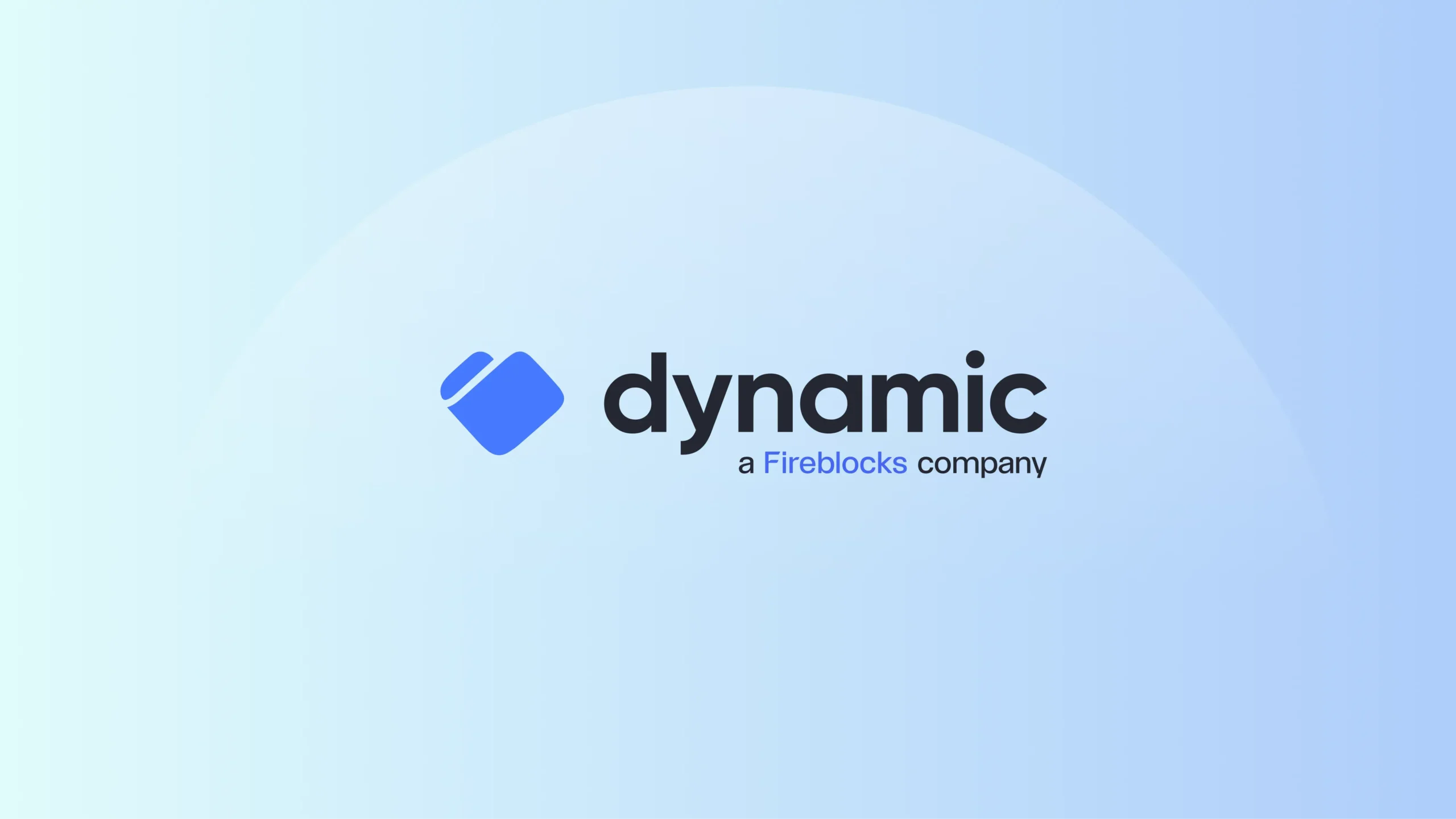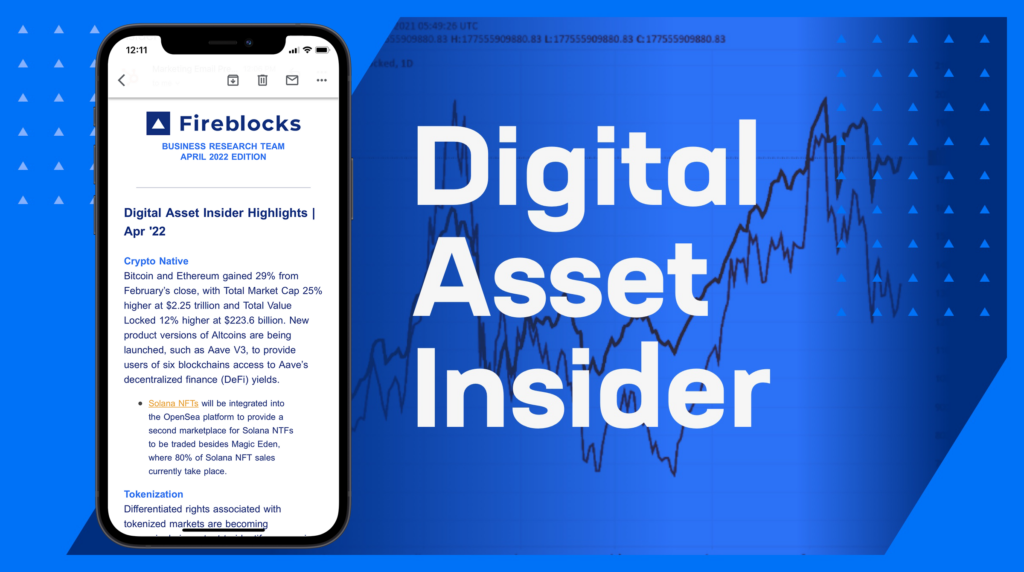Digital asset markets steadily recovered in the last half of March. We were excited to be an integral part of the ANZ Australian Dollar Stablecoin (A$DC) launch, believing that scalable tokenized solutions are achievable through highly motivated project teams, and clear go-to-market strategies. Decentralized finance is increasingly becoming more interoperable through bridge development between chains, and is growing through investment into Altcoin tokens via traditional investment vehicles.
Crypto Native
Crypto-native prices are moving towards their opening prices for 2022 after spending the first quarter range bound. Bitcoin and Ethereum gained 29% from February’s close, with Total Market Cap 25% higher at $2.25 trillion and Total Value Locked 12% higher at $223.6 billion. Altcoins have moved higher with new product versions being launched, such as Aave V3, to provide users of six blockchains access to Aave’s decentralized finance (DeFi) yields. Solana announced it will integrate with OpenSea allowing non-fungible tokens (NFTs) minted on the protocol access to between $70 to $150 million in daily trading volume on the marketplace.
- Goldman Sachs conducted a successful over-the-counter bitcoin non-deliverable option trade with Galaxy Digital, and provides another financial derivative instrument to institutional clients besides bitcoin futures to trade and manage risk. However, regulators such as the Office of the Comptroller of the Currency (OCC) are cautioning the banking industry to consider the potential beyond normal distribution risks or “tail risks”, that users of crypto derivatives could be exposed to.
- Aave launched Aave V3 across six protocols allowing assets to be transferred from one blockchain to another and optimize gas use. New security features means newly listed tokens can be isolated, and borrowing limits set to manage exposure to potentially high-risk tokens. Total value locked is expected to increase with more users across multiple blockchains accessing the DeFi lending app.
- Solana NFTs will be integrated into the OpenSea platform and provide a second marketplace for Solana NTFs to be traded besides Magic Eden, where 80% of Solana NFT sales currently take place. Solana transaction fees are lower than Ethereum-based NFTs and transact faster on the protocol attracting NFT issuers and traders alike.
Tokenization
Differentiated rights associated with tokenized markets, whether traditional or crypto-native, are becoming increasingly important to identify, as varying token standards can be applied or used with similar asset types. For example, a commercial property can be tokenized as a single non-fungible token (NFT) with all of the ownership rights assigned to the NFT, or alternatively it could be part of a real estate investment trust (REIT), and the REIT tokenized using the ERC-20 token standard. From an equity cap and token cap table perspective, the ability to characterize ownership and rights associated with the tokens can be enabled by labeling blockchain addresses to ownership types and transactions types. Not only will this bring transparency to ownership and token rights, it could also enable improved AML/KYC transactional characterization, thereby focusing resources with greater precision on potential bad actors instead of good ones.
- The Australian Dollar Stablecoin, A$DC, was launched by Australia and New Zealand Banking Group (ANZ), one of the largest Australian banks, on the Ethereum blockchain, where $30 million was minted using Fireblocks’ tokenization solution, and traded on the registered digital currency exchange Zerocap. Institutional clients will have access to A$DC and retail clients at a later stage.
- Sequoia has led seed funding for Sprout, a company focused on managing the ownership of digital assets across blockchain protocols. The technology characterizes the ownership of tokens and the transaction types associated with transactions to form a token cap table bringing transparency to token ownership, and the transactions associated with them, whether it is investment related by an investor, or payroll related to an employee incentive program.
Regulation | Regulators
Crypto-directed regulation is expected from multiple developed economies, as clear guidelines are essential to ensure their use in a clear and safe context. Tax legislation and accounting standards will need to be updated. The United States Securities and Exchange Commission continues to reject spot-bitcoin exchange-traded fund applications citing the same reasons around applicants “inability to prevent fraudulent and manipulative acts and practices”.
- Consumer protection oriented legislation in Australia is set to address crypto related issues in the proposed Digital Services Act (DSA), expected to cover licensing, custody, taxes, debanking and decentralized autonomous organizations.
- Singapore’s Finance Minister, Lawrence Wong, announced that income earned from non-fungible tokens (NFT) or trading will be subject to income tax. Capital gains are not taxed in Singapore and therefore capital gains on NFTs would not incur tax.
- The United Kingdom is expected to release crypto regulations in the coming weeks with a focus on stablecoins. Meanwhile the Bank of England is seeking wider powers to oversee digital assets as they continue to grow, warning that crypto could pose a risk to markets.
- NYSE Arca and BZX applications for spot-bitcoin exchange-traded funds (ETFs) were rejected by the United States Securities and Exchange Commission (SEC). In these cases, the SEC stated again the reason for the rejection being related to the firm’s inability to set rules which are “‘designed to prevent fraudulent and manipulative acts and practices’ and ‘to protect investors and the public interest.’” A list of other rejected EFT applications can be found in the January 2022 edition of the Digital Asset Insider.
Payments | Settlement
Traditional fintech firms are increasing their connectivity to digital asset infrastructure firms and exchanges, allowing secure frictionless exchange and transfer between fiat and digital assets. Large businesses with broad consumer-bases are increasing their acceptance of cryptocurrencies for payment, as they become common holdings in a personal crypto wallet. Traditional payment service providers are also expanding their efforts to develop the digital asset ecosystem through their own programs supporting their natural client based (existing and emerging merchants), who would use their payment systems that are being enabled for digital assets.
- Fintech payments firm Stripe is set to allow cryptocurrency transactions through their payments platform having stopped offering those services in 2018 due to high transaction costs. Stripe aims to allow crypto businesses a payment processing platform through which both fiat and digital currencies can flow seamlessly and incorporate security features that prevent fraud and secure identity verification technologies.
- Acceptance of cryptocurrencies for payment gained a boost in the United States, with movie theater-chain AMC accepting Dogecoin (DOGE) and Shiba Inu (SHIB) tokens as payment for online transactions via Bitpay. Other major consumer-retail oriented businesses directly accepting cryptocurrencies include Starbucks, KFC, and Burger King.
- Visa launched the Visa Creator Program designed to support content creators and entrepreneurs to grow their businesses using non-fungible tokens (NFTs). The program includes access to Visa’s internal NFT technical and commercial knowledge, and cash funding for participant projects.
Decentralized Finance
Decentralized Finance (DeFi) participants are growing the ecosystem from all angles by funding decentralized applications (dApps), creating bridges through applications and projects promoting cross-chain interoperability, and launching their dApps across different protocols. Traditional markets are also being leveraged to provide institutional and retail clients access to digital asset markets through regulated exchanges, all of which can be expected to result in total value locked growth for those assets.
- Cross-chain transaction enabler, LayerZero Labs, is set to get a funding boost from Sequoia Capital, A16z, and FTX Ventures in a $135 million Series A+ funding round. The ideology of Decentralized Finance (DeFi) lends itself to allowing the development of multiple blockchain protocols, indicating the need for blockchain interoperability solutions. LayerZero’s Stargate auto market maker is one of the firm’s solutions to bridge liquidity across chains and use native assets versus wrapped tokens. Similarly, Algorand State Proofs seeks to solve the interoperability problem across Proof of Stake blockchains by providing an interoperability standard and solution.
- Regulated European exchange traded products (ETPs) are providing retail clients access to DeFi markets through firms such as Valour, which now has around $274.12 million assets under management. Valour launched two ETPs for Cardano and Polkadot on the Nordic Growth Market, while WisdomTree recently launched ETPs for Solana, Cardano and Polkadot on the Swiss stock exchange SIX and Germany’s Börse Xetra. CoinShares also launched the CoinShares FTX Physical Staked Solana ETP on Xetra with FTX.
- In one of the largest exploits in DeFi history, the Sky Mavis Ronin Network Bridge has taken a loss of 173,600 ETH and 25.5 million USDC, worth over $600 million in total. The hacker’s ETH wallet address is being monitored by Chainalysis with 6,250 ETH withdrawn to multiple addresses, while all of the USDC has been transferred out. The hacker attacked the validator private keys of four Sky Mavis validators and one Axie DAO validator.
Centralized Finance
Regulators in Asia, Europe, and the Middle East have been actively granting virtual asset service provider (VASP) licenses to firms looking to provide exchange and payment services involving digital assets in their domestic jurisdictions. As more firms become licensed, the adoption of digital assets by institutions and retail clients will become more mainstream and increase their potential to be accepted as a means for payment and storing wealth.
- Binance received a virtual asset service provider (VASP) license in Dubai, United Arab Emirates (UAE). This gives the exchange a second license to operate in the region, in addition to the one received from Bahrain. FTX exchange received their license to operate through FTX Europe in the UAE around the same time as Binance in mid-March.
- In March, Paxos, Hodlnaut, and Digital Treasures Center (DTC) received in-principle approval from the Monetary Authority of Singapore (MAS) to operate and provide digital payment token (DPT) services as governed under the Payment Services Act 2019. Full licenses have only been granted to four firms – DBS Vickers, Independent Reserve, FOMO Pay and TripleA.
- The Portuguese central bank, Banco de Portugal, has granted Utrust, a crypto payments firm, a full all-category license to operate as a virtual asset service provider (VASP). The firm will offer services that include custody and transfer of digital assets, as well as exchange services between fiat to digital assets, and between digital assets.
Custody
Traditional financial institutions continue to expand their institutional digital asset custody services as their infrastructure rolls out and digital asset client base grows. Legislators and financial regulators are taking steps to put into place regulation that allows or will allow clarity on what firms are able to and what it means to custody digital assets.
- Bank of New York Mellon (BNY Mellon) is working towards providing custody services for institutional clients later in 2022. Circle internet Financial recently announced its appointment of BNY Mellon as the primary custodian of USD Coin (USDC) reserves with over $50 billion in market capitalization.
- In 2020, the United States Securities and Exchange Commission (SEC) previously sought public comments on the qualified custodian status in relation to digital assets. The Investment Advisers Act of 1940 contains the “Custody Rule” or “Advisers Act” requiring advisers to hold client’s securities with a designated qualified custodian. The SEC’s Director of the Division of Investment Management, William Birdthistle, addressed attendees at the IAA Investment Adviser Compliance Conference, stating that he plans to consider recommendations received in relation to the Custody Rule as it relates to digital assets.
- The state of Virginia in the United States passed a bill allowing banks to custody digital assets, subject to meeting certain requirements. Back in 2020, the Office of the Comptroller of the Currency (OCC) allowed all nationally chartered banks in the United States to provide custody services for digital assets, which some had subsequently sought to explore and provide.
CBDCs
After positive outcomes from CBDC-related projects, central banks are expected to take further steps to develop the platform on which cross-border transactions can be made a reality. However, non-technical issues remain, and need to be addressed at a national level. On the consumer front, acceptance of retail CBDCs will need to take into consideration the practicalities of everyday use, and broad merchant acceptance as a means of payment, both online and physical stores.
- The Bank for International Settlements (BIS) released a report on the finding from Project Dunbar focused on the common platform for handling multiple central bank digital currencies (CBDCs) for cross-border transactions. The project involved central banks from Australia, Malaysia, Singapore, and South Africa. Three challenges highlighted were:
- Should banks be able to access CBDCs from countries where they do not have a local presence?
- How can cross-border payments be simplified while still respecting each country’s regulations?
- What is a governance structure that allows countries to share their payment infrastructures while taking into account factors like national security.
- The results, while technically promising, identify the need for non-technical related issues to be resolved between the central banks from a regulatory, inclusionary and national sovereignty perspective.
- European Central Bank (ECB) focus groups indicate that a digital euro would be adopted more readily with the ability to use the digital currency in both online and physical stores. Concerns around privacy would need to be addressed alongside usability in policies related to the digital euro.
ESG Impact
Frameworks for green-related standards and metrics are voluntarily incorporated into green investments. As clarity around these standards increase and their application becomes more entrenched, blockchain technologies supporting green investments will serve as an enabler for issuers and investors to achieve the ambitious 2050 net-zero carbon target.
- Green bond issuance is expected to reach $1 trillion by the end of 2022. However, concerns are being raised on “greenwash” bonds issued for projects that do not even meet voluntary green bond standards. European negotiations on the current voluntary use of green bond standards need to determine if they remain voluntary or be made mandatory to address concerns. In the meantime, investors need to be more discerning before investing in green bonds.
- Singapore-based digital exchange MetaVerse Green Exchange (MVGX) has partnered with China based real estate giant Greenland Group, allowing qualified investors to trade its tokenized carbon credits, called Carbon Neutral Tokens (CNT), on the exchange. MVGX holds a capital markets service (CMS) license from the Monetary Authority of Singapore (MAS).
- Carbon credit tokenization could provide a mechanism to facilitate transparency, access, and liquidity, as more attention is paid to these markets as part of the 2050 climate goals. However, on its own, carbon offsets have a unique set of challenges that need to be resolved within the industry.
- Blockchain technology is helping micro-workers in Kenya, who are completing online tasks to earn an income, to receive payments via Stablecoins at a transaction cost as low as 2.02% for a cross-border payment versus 111% using traditional fiat payment processes. The Celo Blockchain was used to receive USD-based stablecoins paid to a Valora crypto wallet, where it could be stored or staked to earn yield. Alternatively, stablecoins are withdrawn through an off-ramping application, Kotani Pay, which connects users to an M-Pesa digital wallet allowing them to spend converted USD-based stablecoin to Kenya shillings.
Crypto-Native Market Analytics
Bitcoin recovered from the end-January lows around $35,000 to $48,000 at the end of March as risk assets overall regained their composure despite continued Russian military action against Ukraine. Crypto-native markets across the board moved higher, which was reflected in Total Market Capitalization breaching the $2 trillion mark once again, and Total Value Locked moving to over $200 billion.
CHART OF THE MONTH: DeFi Chain Battles Part 3

Terra’s Total Value Locked (TVL) clearly separated the protocol from the pack, closing the month at $28.6 billion (gained $9 billion, 46%).
Fantom’s TVL dropped to $6.4 billion (fell $4.6 billion, 41%) as news of technical advisor Andre Cronje and solutions architect Anton Neil announced their departure from the crypto ecosystem entirely, and from slowing adoption of the protocol by developers.
MONTHLY CHANGE

Aave surged almost 70% as the launch of Aave version 3 neared, which supports six different blockchains.
TOP 10 MARKET CAPITALIZATION

Altcoins surged the most in market capitalization as prices generally recovered from the January lows.
BITCOIN [BTC]

Bitcoin reached $48,000 in the final days of March clearing $45,000 which could be considered a prior support turned resistance area. Long-term, a higher low was set on 24 Jan at $33,225.
ETHEREUM [ETH]

Ethereum broke the immediate downtrend and resistance at $3,200. A short-term uptrend is in play with a long-term higher low set at $2,172.
BITCOIN : STOCK TO FLOW RATIO [BTC:STFR]

BTC is lower than STFR indicating it is undervalued.
BTC: ALL EXCHANGES NETFLOW

There were only 4 days in March with net inflows into exchanges with BTC price range bound.
REGIONAL BTC FLOWS [Last 7 Day Average, Apr 1]

Regional flows within Western Europe reached over $500 million likely attributed to the ongoing conflict between Russia and Ukraine.
There were higher flows from a percentage change perspective in Western Europe and Rest of World.
Assets typically flow within a region, likely due to preferences for local exchanges, but flows between regions often occur as a result of regulatory concerns, geopolitical changes, or significant market price variations.
TOTAL VALUE LOCKED [TVL, Mar 31]

TVL rose $23.9 billion (12%) to $233.6 billion, as ETH gained in price month-on-month.
PROTOCOL POSITION [TVL, Mar 31]

Total value locked (TVL) for Terra increased $9.02 billion attributed to dApps like Anchor Protocol $4.67 billion, Lido $2.72 billion, Astroport $0.33 billion, and Stader $0.36 billion.
DEFI PULSE INDEX [DPI]

Top 5 Tokens: Uniswap, Aave, Maker, Loopring and Synthetix.
Index information can be found at the Tokensets.com.
This reCap is distributed for general informational and educational purposes only and is not intended to constitute legal, tax, accounting, or investment advice. For other important disclosures.


